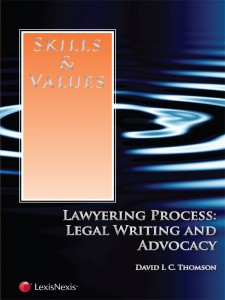Skills & Values: Lawyering Process
 I am pleased to announce that my new book, Skills & Values: Lawyering Process - Legal Writing and Advocacy was published by LexisNexis/Matthew Bender last week. Sample copies will be available for review at the ALWD Conference in Milwaukee, Wisconsin this week.
I am pleased to announce that my new book, Skills & Values: Lawyering Process - Legal Writing and Advocacy was published by LexisNexis/Matthew Bender last week. Sample copies will be available for review at the ALWD Conference in Milwaukee, Wisconsin this week.
Skills & Values: Lawyering Process is an entirely different sort of legal writing textbook. Which is probably a good thing, since today we have a plethora of legal writing textbooks from long-time leaders in our field, folks such as Helene Shapo, Linda Edwards, Charles Calleros, Anne Enquist, Richard Neumann, and Laurel Oates. Many of these books are in their fifth or sixth editions now. Teachers of the legal writing and advocacy course have a diverse and mature group of legal writing textbooks to choose from when they decide on a text for their courses.
The design of this book, however, is quite different from the traditional legal writing textbook in several ways. First, it is a hybrid text, which means only a portion of the entire text is printed, with the rest residing on the Lexis Web Courses platform. This allows the book to be somewhat cheaper and students have less to lug around, but even better, it allows for more interactive features in the online portion of the text that can be achieved in print. In addition, for the professor who might decide to adopt this text, it comes with a fully populated Web Course for their students all ready to go, as well as an online Teacher's Manual with Prezis and PowerPoints to use or adapt for class, handouts, a closed memo assignment, email memo assignments, and checklists for various aspects of the legal writing process.
Second, it is based on the assumption that students today need to read less and do more. To be active rather than passive. Aristotle said: “What we have to learn to do, we learn by doing.” It is no secret to educators at all levels that our students are changing. Some assume this is an entirely bad thing, and lament the “short attention span” of the Google generation. But most teachers would rather, as teachers have for millennia, reach their students where they are with what they need. The design of this book should help them do that.
Third, students are just learning this material for the first time, and perhaps they do not need, in the 1L year, quite so much information about the writing process. They certainly do need a deeper understanding later in law school, and in practice. But as they are first learning how to do, they need to do, rather than spend so much time reading about it. So the chapters and topics covered in the print book are covered at a depth that is less than a traditional textbook. They are designed to introduce the basic concepts of legal writing and advocacy, and to be supplemented with additional interactive information on the online site, and then used.
Finally, it is rare to select a legal writing text that is designed very closely to the way each professor teaches the course. Because all of the books have their own approach, which might be different from our own in some ways, we end up compensating for the differences in class and in handouts and in assignments, and this can be confusing for students. The idea of this text is to be the most flexible of them all, by putting in the hands of teachers the ability to assign a small amount of reading, and then to use the online materials (and their own) in the way that most suits how they prefer to teach the material.
As with all of the books in the Skills & Values Series, this is an entirely different way to think of a law school text than what we have had in the past. And yet it is not entirely unfamiliar either. It is designed to be flexible, adaptable, and designed to teach our students what they need to become well rounded and skilled professionals in the ways they best learn, so that we may best prepare them for their future, not our past.
I am grateful to my hosts during my sabbatical, the Institute for the Advancement of the American Legal System (IAALS). They have given me an office where I have been working since January, and this helped me to focus on finishing this book. They are a wonderful group, and it has been a pleasure to be around them.
This post originally appeared on David Thomson's blog, Law School 2.0, on June 17, 2013. Thomson is also an Educating Tomorrow's Lawyers Fellow, and shares his innovative Discovery Practicum course online.


